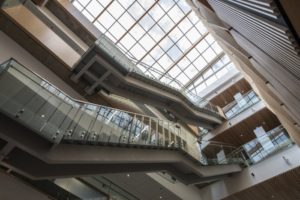Camosun College recently received a $500,000 grant from Colleges and Institutes Canada through the Global Skills Opportunity (GSO) program, which will allow students to experience other cultures through a study-abroad program. In addition to the GSO Grant, Camosun has received a further $90,000 through the One World Scholarship from the Irving K. Barber British Columbia Scholarship Society, according to Camosun global partnerships specialist Marius Langeland.
Camosun’s Centre for Indigenous Education and Community Connections, Eyēʔ Sqȃ’lewen, has connections with educational partners in Europe, Japan, Korea, and New Zealand, and students can go there for up to two consecutive semesters, says Langeland, who adds that it’s important for students to know ahead of time what they’re getting into.
“Being prepared and doing your research is very important so you know what to expect,” he says.
Students who access the program must be prepared to shoulder the financial burden of travel, but there is also a silver lining. Technically, students are required to pay for transportation, insurance, accommodation, and their regular tuition, but the GSO grant exists to help them do that. (How much funding each student could potentially get depends on the situation, and on how many students apply, says Langeland.)

Camosun has also partnered with the Ara Institute in New Zealand to create a two-year program, including an on-land component where students will spend two or three weeks abroad learning about the Indigenous Maori culture first-hand, including linguistic and cultural knowledge sharing.
Langeland says that most of the funding, and available seats, will be reserved for Indigenous and low-income students as a way to increase the opportunities available to them.
“One of the goals of the Global Skills Opportunity program is to widen access and participation,” he says. “Indigenous students and low-income students are part of our target group, and that’s why we’ve decided to set aside most of the funds for these types of activities.”
Langeland says that this year, Camosun will make greater efforts to guide students through the experience in a holistic manner, which was lacking in prior years.
“In the past there was no focus—no one cared about what happened to students when they returned,” he says. “That is something that we take very, very seriously—we will work with everyone who is involved in shaping the experience, and make sure that students get the most out of it before they leave, during the program, and also when they return. It’s about strengthening the wraparound supports and making sure students get more of a holistic experience.”
Many students may not consider themselves a good fit for the program because of financial or logistical limitations, but Langeland encourages interested students to inquire anyway.
“There are opportunities, there are things that we can do,” he says. “As long as we get to sit down with you and get to know what your plans are and how much time you have, we can help identify and carve out pathways. It’s a great opportunity, and we’ll do whatever we can to work directly with students and promote it.”
Langeland says that the adventure was a profoundly life-changing experience of discovery for some previous participants.
“They found out that sometimes the way they think needs to be more inclusive and open, and it was through these experiences that they had with other Indigenous students, in other settings and environments, they learned a lot about themselves,” he says.
A previous transfer student from Norway himself, Langeland says he has experienced this journey firsthand.
“I fully understand the life-changing opportunities that an experience like this can have, and the importance of it, as well,” he says. “Myself and so many in our office are not from here, we have gone through that experience ourselves and seen the value in it, and we know where the challenges are, and how to overcome them. So I’m super excited for what lies ahead.”
